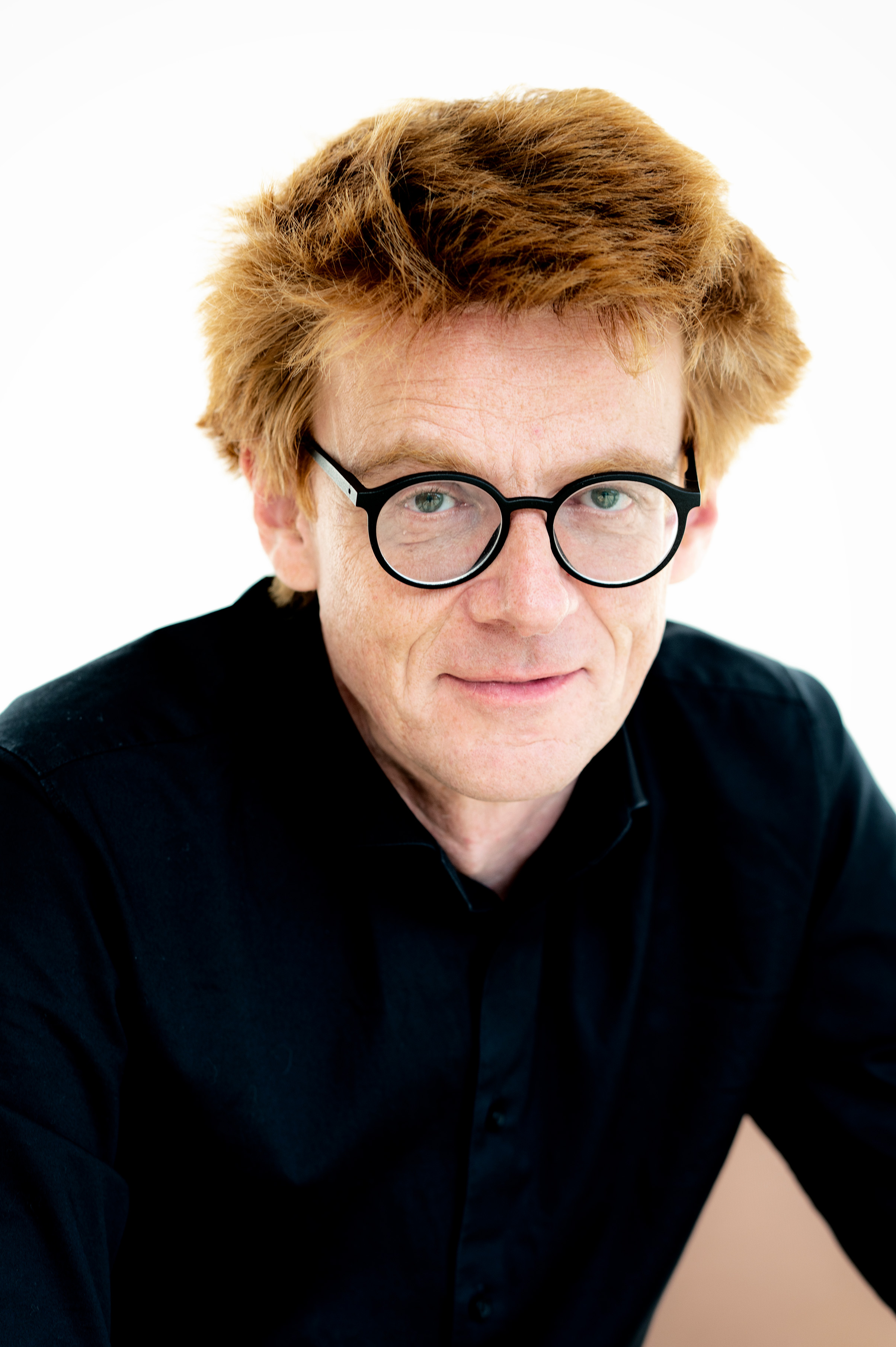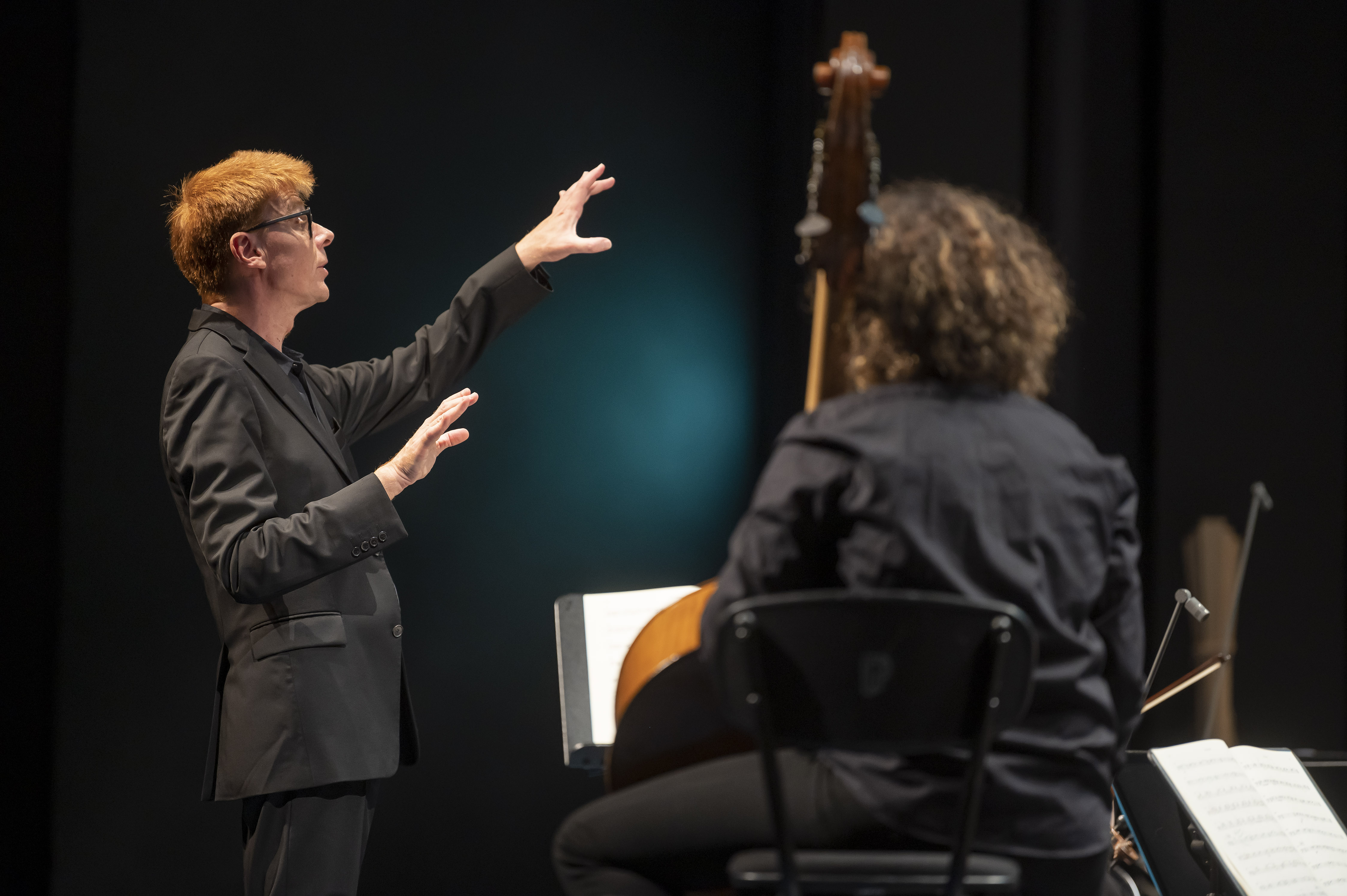Enno Poppe @Lucerne Festival 2023 – A portrait by Annelis Berger
Enno Poppe is considered one of the most original composers of our time. The 55-year-old composer’s music is highly complex and yet extremely attractive to the ears and often as exciting as a thriller. Enno Poppe is this year’s composer-in-residence at the Lucerne Festival. He’ll present his work Fett, among others, as well as the orchestral piece Prozession.
Annelis Berger
He is a city person through and through: “Life in the countryside would be too complicated for me. I really like living in the city, where I can buy a litre of milk at any time without having to think much. This doesn’t mean that I don’t like to climb a mountain or jump into a lake sometimes.” Unfortunately, he won’t have time for that in Lucerne: “No way, I know that from the last time I worked with the Academy. I look after some 100 young people, all greedy and hungry for knowledge; they want to work from morning to night and experience things, so no time for climbing mountains”.

Poppe studied composition and conducting in Berlin, still lives in the German capital and works throughout Europe with the most important contemporary music ensembles. I met him in Zurich, where he has just rehearsed with the Collegium Novum ensemble. A midsummer late afternoon, Poppe could just have a beer before the interview. We first talk about what distinguishes his music.
“I like intense and expressive music, I like to take the listeners with me. But I have to look for a new form of expressivity, expressivity cannot only be claimed, nor can it be imposed or sentimental. I cannot borrow the expressivity of a Bruckner symphony, I have to find one that has something to do with today and with the means available today. It is not simply a search for new sounds, but a search for a new expressivity. That’s something that constantly occupies me.”
The piece Procession is an example of this. “The work is actually a single process of growth,” says Poppe. “It begins with single notes, from which melodies emerge, then chords, which accumulate into chorale-like passages and the piece continues to build up, becoming more and more intense. Formally, there are nine big waves of increase, the sixth being the biggest and then it slowly decreases again. Every single musician in the ensemble has a solo part here and then leads one part at a time until the next part comes with the next solo.”
Enno Poppe, Procession, 2015/20, Ensemble Musikfabrik Köln, conductor Enno Poppe, Ensemblefestival for Contemporary Music 2020, Leipzig Kölner Philharmonie Nov. 22nd, 2020
An important source of inspiration for this work was the Catholic procession “Semana Santa” in Seville, which takes place every year during Easter. “They run through the city for seven days, 24 hours at a stretch with brass bands and drums, the Basel Fasnacht is a doddle compared to that. This Spanish processional music has a deep connection with the piece, without me quoting it directly.”
Prozession is a work that develops a pull during the listening process, as it really becomes denser and denser and one can hardly escape it. The work also conveys the feeling of tenacity: there’s no way of evading this music, its expressivity is very direct.
Enno Popp finds a compositional means for expressivity in glissandos and vibratos, which is beautifully demonstrated in Wald from 2010 for four string quartets. For many years, Enno Poppe has been working with the “moving” tone, inspired, among other things, by the Asian tradition of tones that are always in motion, i.e. one never hears the same tone twice, the musician intones it differently each time. Enno Poppe has often worked with this. “In Wald, every note is constantly sliding, moving up and down, back and forth. At the most varied speeds. That, in turn, is immensely expressive, because every single tone becomes animated.”
Enno Poppe also deals with the “moving” sound in the ensemble work Scherben, in the recording with the Collegium Novum Zürich, conductor: Enno Poppe, 2008, in-house production SRG/SSR.
Enno Poppe talks easily about his music. It is rare to find composers who do this in such an uninhibited and relaxed way. That makes a meeting with him very pleasant.
Of course I would also like to talk with him about the work Fett, one of the highlights at Lucerne Festival, conducted by Susanna Mälkki in the great KKL hall: “The piece IS indeed fat! Otherwise it shouldn’t be called that,” he says with a smile. In this composition, Poppe completely dispenses with melodies and themes and everything else that classically characterises symphonies. He worked with Chord clusters – at first only four-note chords that get bigger and bigger. “Towards the end we have 40-50-note chords! And not just octaves, but microtonal agglomerations.”
Enno Poppe, Fett (2018/19): Helsinki Philharmonic Orchestra, conductor Susanne Mälkki, World premiere 10.5.2019, Helsinki Music Center
Finally, the conversation turns to the composer’s working method. He always enjoys both composing and conducting. Otherwise he wouldn’t do it at all. Sometimes, when opening a door to a new tonal world for a composition – like the microtonal agglomerations in Fett’s case – it is very easy for him because he quickly finds himself at ease in the new world. “Fett went incredibly fast. I was really into it. It was untouched terrain, which always invigorates me, I can then sometimes work very quickly. For Fett it took me about ten weeks, it’s actually a mystery to me why it went so quickly, because there are an incredible number of notes in this work.” There is a sense of lightness – and that is precisely what distinguishes Enno Poppe’s music: it is complex and multi-layered, but never bulky. This takes the listener on a journey through a world that never stands still.
Annelis Berger

Enno Poppe at Lucerne Festival 2023
Susanna Mälkki, Ensemble Musikfabrik
broadcasts SRF 2 Kultur:
Künste im Gespräch, 3.8.2023, Enno Poppe, Composer in Residence am Lucerne Festival, editor/author Annelis Berger.
Musik unserer Zeit, 13.9.2023, Enno Poppe im Portrait, editor/author Annelis Berger.
Neo-profiles:
Enno Poppe, Lucerne Festival Contemporary, Collegium Novum Zürich

